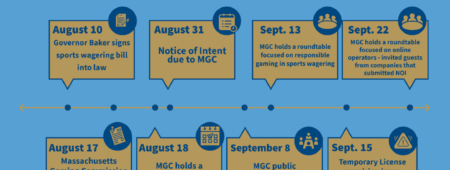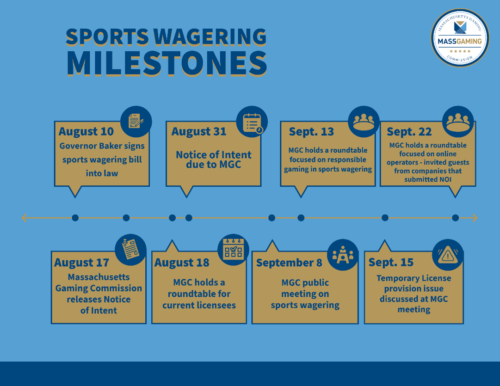An MGC Update on the Promulgation of Sports Wagering in Massachusetts
- September 30, 2022
- by MGC Communications
- 0 comments

When Governor Charlie Baker officially signed An Act to Regulate Sports Wagering into law on August 10, 2022, the work of the Massachusetts Gaming Commission (MGC) to regulate and stand up the new industry officially got underway.
Since the 2018 Supreme Court decision overturning the Professional and Amateur Sports Protection Act, the MGC has been monitoring proposals filed in Massachusetts to legalize sports wagering. With many of these proposals designating the MGC as regulator, staff and commissioners paid close attention to legislative action to understand the role the MGC may ultimately play in the industry. When a bill was eventually passed in August 2022, the MGC was ready to begin our official responsibilities.
Ahead of the bill being signed into law, the MGC held a public meeting to discuss the bill that passed the legislature and identified over 200 regulations that would be required for this new industry. Following the Governor’s signature, the MGC held additional roundtables on sports wagering with current licensees and members of the responsible gaming community. These conversations were helpful for the MGC and provided a public setting for those interested to learn about what will be required to bring sports wagering to the Commonwealth.
>>MORE: Sports Wagering in Massachusetts
The legislation designated three unique types of licenses that the MGC would ultimately award to qualified entities; Category 1 licenses for established and licensed casinos in the Commonwealth, Category 2 for established and licensed horse tracks/simulcast centers in the Commonwealth, and Category 3 for mobile/digital operators. The MGC is permitted to award up to seven Category 3 licenses not tethered to a Category 1 or 2 license. There are additional limits of two and one, respectively, of Category 3 licenses awarded to entities tethered to Category 1 and 2 licenses.
The MGC asked that those interested in obtaining a Category 3 license fill out and return a Notice of Intent form to help provide a clear understanding of the level of interest in licensure. The response was resounding with over 40 companies submitting a Notice of Intent.
>>MORE: Learn which companies filed a Notice of Intent with the MGC
With seven untethered Category 3 licenses available, a competitive process to award those licenses must be developed to ensure equity. The MGC is in the process of beginning to accept applications and review proposals; however, along the way, a quirk in the law became evident that would likely cause some problems as sports wagering is implemented.
A temporary license provision was written into the bill directing the MGC to award temporary licenses to a “qualified gaming entity” that pays a $1 million fee allowing them to operate in the state for up to one year until the MGC awards seven untethered Category 3 licenses or determines a given operator to be unsuitable. While there is a cap on untethered Category 3 licenses, there is no such cap on temporary licenses. This presents consumer protections, as well as business operations, issues for every stakeholder of Massachusetts sports wagering.
The MGC has spent considerable effort navigating a model where the legislative intent, letter of the law and operational needs can be met.
At a public roundtable with stakeholders from companies that filed Notice of Intent forms held on September 22, the MGC heard directly about the issue of temporary licenses. Most companies agreed that the way the law is written presents an untenable situation. Nearly universal was the desire to see a workable temporary license structure set up for those that, after meeting initial suitability, are determined to likely to receive a full license. However, without a legislative fix to this now legally binding language, the MGC has few options to modify this section of the law.
Moving forward, the next steps are clear. The MGC will be making decisions on regulations, applications and the licensing process. All these decisions will directly impact the milestones that will lead to an ultimate launch of sports wagering in Massachusetts. Since the day the law was signed, MGC commissioners have said their goal is to roll out sports wagering in a way that protects consumers and brings an industry with a high level of integrity to the Commonwealth. Next on that list is bringing the product to market as quickly as possible to impact the black market of nefarious operators taking illegal sports bets.
As an agency bound by the Open Meeting Law, all of the MGC’s deliberations are held publicly. The next meeting the MGC will hold is scheduled for October 6, 2022 – the public is invited to watch the meeting on MassGaming.com to learn more about the process.
